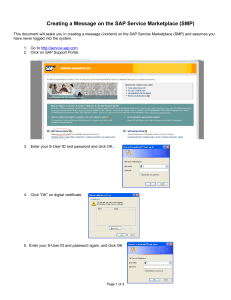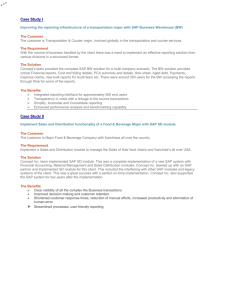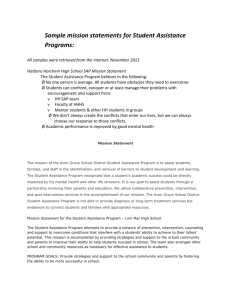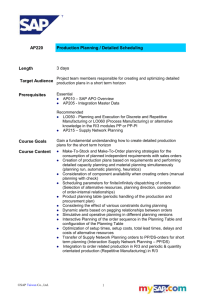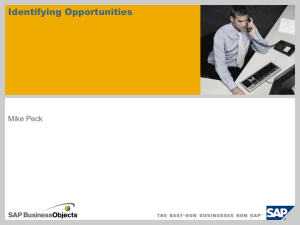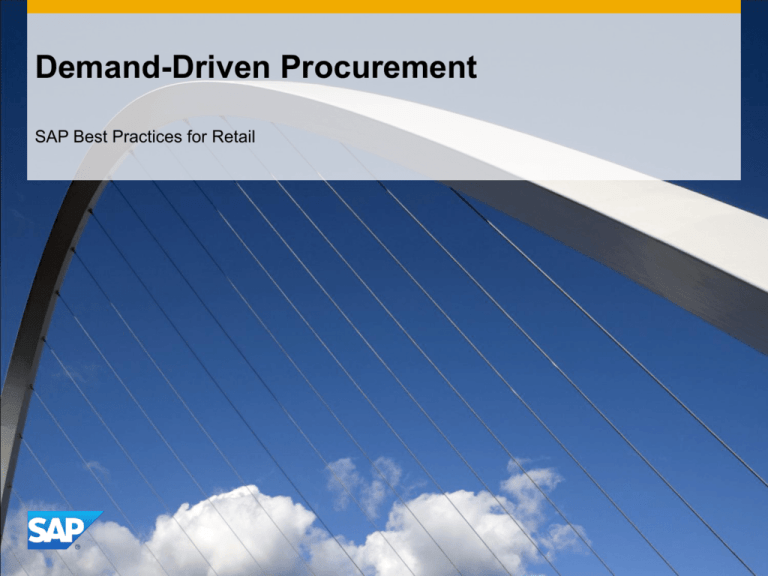
Demand-Driven Procurement
SAP Best Practices for Retail
Purpose, Benefits, and Key Process Steps
Purpose
This scope item begins with the required planning steps. The forecasting processes and different consumption-based
MRP procedures. The supply source determination schema in SAP ERP is then outlined in brief and the various options
explained. The Purchase Order process shows you how to work with the Planning Workbench. Order optimizing
comprises quantity optimizing, investment buying, load building and goods receipt capacity check. The last section shows
you how vendor evaluations can be used to optimize goods procurement.
Benefits
Alongside article-specific inventory management, the SAP ERP System provides an accurate data basis for using the
comprehensive range of requirements planning methods. The main task in requirements planning is to monitor stocks and,
in particular, generate automatic order proposals for purchasing.
With the planning workbench, extensive functionalities for order optimization and vendor evaluation you can handle the
whole process for demand-driven procurement.
Key Process Steps
Requirement Planning
Planning Run
Supply Source Determination
Contract Processing
Planning Workbench
Order Optimizing
Purchase Order Monitoring
Vendor Evaluation
© 2014 SAP SE or an SAP affiliate company. All rights reserved.
2
Required SAP Applications and Company Roles
Required SAP Applications
SAP Enhancement Package 7 for SAP ERP 6.0
Company Roles
Retail Non-Seasonal Purchaser
Retail Non-Seasonal Purchaser – Power User
Retail Non-Seasonal Purchase – Manager
Retail Replenishment Planner
Retail Replenishment Planner – Power User
Retail Masterdata Manager
Retail Warehouse Clerk
© 2014 SAP SE or an SAP affiliate company. All rights reserved.
3
Process Flow Diagram
R. NonRetail
Seas.
Replenishment
Purch.–
Planner
Power U
Retail Non-Seasonal Purchaser Event
Demand-driven Procurement - Requirement Planning
Unload
Materials
from
Truck
MRP Procedure
Automatic
reorder point
planning
MRP
Procedure
Time-phased
planning
MRP Procedure
Time-phased
planning with
reorder point
planning
Carry out the
individual
Forecast from
the article master
MRP Procedure
Forecast-based
planning
Optional:
Planning File
Alternative:
Carry out the
individual
Forecast from
the menu
Optional:
Reprocess the
Forecast
results
© 2014 SAP SE or an SAP affiliate company. All rights reserved.
Carry out
Single-Item,
Single-Level
Planning
Optional:
Evaluating the
Planning
Results
Convert the
Purch.
Requisition to a
Purchase Order
Enter goods
receipt in
distribution
center
4
Process Flow Diagram
Demand-driven Procurement - Supply Source Determination
Supply
Source:
Source List
Release Order
for the
Contract
Maintain
Source List
Automatic
Conversion of
the Purchase
Requisition to
a Purchase
Order
Automatic
conversion of
PR to PO
Goods receipt
in DC
Display
purchasing
info record
Supply
Source:
Purchase Info
Record
Create
Purchase
Requisition
Retail Replen.
Planner Power
User
Retail NonSeas.
Purchaser
Retail Non-Seas.
Purchaser Power User
Retail
Replenishment
Planner
Event
Unload
Materials
from
Truck
© 2014 SAP SE or an SAP affiliate company. All rights reserved.
Create Purchase
Order with
reference to P.
Requisition
Purchase
Requisition
(Assign Supply
Source)
Create
Contract
5
Process Flow Diagram
Create
purchase
requisition
Release order
for contract
Goods receipt
in the
distribution
center
Create
contract
Retail Replen.
Planner Power
User
Retail NonSeas.
Purchaser
Retail Non-Seas.
Purchaser Power User
Retail
Replenishment
Planner
Demand-driven Procurement – Contract Processing
Display release
documentation
© 2014 SAP SE or an SAP affiliate company. All rights reserved.
6
Process Flow Diagram
Retail Replenish.
Planner
Demand-driven Procurement - Purchase Order Process and Vendor Evaluation
Order
cancellation
Retail NonSeas.
Purchaser
Retail NonSeas. Pur.
Power U.
Online
requirements
planning
Good receipt
in the
distribution
center
Check stock
Check
consumption
& forecast
values
© 2014 SAP SE or an SAP affiliate company. All rights reserved.
Article master
data
Create PO via
eCATT
Storage costs
Order release
Create PO
Shelf life,
expiration date
(food only)
7
Process Flow Diagram
Retail
Masterdata
Manager
Demand-driven Procurement - Purchase Order Process and Vendor Evaluation (contd.)
Order
cancellation
Retail Non-Seas.
Purchaser
Retail NonSeas. Pur.
Power U.
Online
requirements
planning
Terms of
payment
Good receipt
in the
distribution
center
Individual
forecast
Check stock
Check
consumption
& forecast
values
Article master
data
Create PO via
eCATT
Storage costs
Order release
Create PO
Maintain
forecast
values
Retail
Replen.
Planner
Power User
Future price
changes
© 2014 SAP SE or an SAP affiliate company. All rights reserved.
Shelf life,
expiration date
(food only)
Carry out
forecast
Requirements
determination
procedure in
investment
buying
Return on
investment
Investment
buying
analysis
8
Process Flow Diagram
Demand-driven Procurement - Purchase Order Process and Vendor Evaluation (contd.)
Retail Non-Seas.
Purchaser / Manager
Retail NonSeas. Pur.
Power U.
Maintain
vendor
evaluation
manually
Create goods
receipt in
distribution
center
Automatic reevaluation
Display open
PO
Execute
evaluation of
article /
merchandise
category
Rank lists
Create goods
receipt in
distribution
center
Display status
data for PO
header
Create PO
Individual
forecast
Retail Replen.
Planner Power
User
Display PO
history
Carry out
single-level,
single-item
planning
Convert PR to
PO
© 2014 SAP SE or an SAP affiliate company. All rights reserved.
Automatic
load building
Load building
results list
Manual load
building
9
Requirements Planning
© 2014 SAP SE or an SAP affiliate company. All rights reserved.
10
Objectives
Automation of the procurement process on site level
Inventory monitoring of a site
Central + distributed application
© 2014 SAP SE or an SAP affiliate company. All rights reserved.
11
Requirements Planning: Forecasting Model
Selection
Manual model selection with additional
automatic test
Manual
Constant model
Trend models
Seasonal models
Seasonal trend models
Models
T: Test for trend
S: Test for season
A: Test for trend
and season
Automatic
Automatic
Model selection
Parameters
Basic value
Basic value
Trend value
Basic value
Season indices
© 2014 SAP SE or an SAP affiliate company. All rights reserved.
12
Requirements Planning: Overview
RP type
Forecast
indicator
?
Articles
Articles
Purchase
Requisition
Item 10
Item 20
Consumption
10/2000
987
values1000
11/2000
12/2000
Forecast
Requirements
1251
Planning
Purchase Order
Item 10
Item 20
© 2014 SAP SE or an SAP affiliate company. All rights reserved.
13
Forecast Applications
Forecast Application
Reorder Point
Reorder Point
Planning
Planning
Calculation of the reorder
point and the safety
stock by the forecast.
Forecast-Based
Planning
The forecast values are
copied as requirements
and replace the reorder
point.
Calculation of the reorder
point and the safety
stock by the forecast.
© 2014 SAP SE or an SAP affiliate company. All rights reserved.
Time-Phased
Planning
The forecast values are
copied as requirements.
The planning run is only
carried out on predefined
dates.
Time-Phased planning can
be applied in combination
with Reorder Point
planning.
14
Source Determination
© 2014 SAP SE or an SAP affiliate company. All rights reserved.
15
Purchase Order: Supply Source Determination
1
40%
40%
60%
?
?
Quota arrangement
Quota arrangement
2
3
PReq
Vendor ??
Art. 3214
20 pc
Art.
5110
15 pc
Purch. requisition
WITHOUT
supply source
Article PCS-04-MRP201
for VZ01 50ea
Source list
Source list
Purch. order
Vendor PCS-V201
Article
Article
• Find external source of
Supply
supply only
• Find internal source of
supply only
• Find internal supply source
first , then external
• Find external supply source
first , then internal
source
ind
. agreements
4 Outline
© 2014 SAP SE or an SAP affiliate company. All rights reserved.
Stock transfer deliv ery schedules
Supplying sites
5
region
20 ea
15 ea
MIT
Supply
Purch info
. records
Regular vendor
Art. 3214
Art. 5110
?
Vendor
Vendor PCS-V201
R3001
16
Order Processing
© 2014 SAP SE or an SAP affiliate company. All rights reserved.
17
Planning Workbench
Manual Planning
Select worklist
- Site
- Vendor
Start variant
Material selection
- Stock planner
- Merchandise category
Default data
Internet Services
- Item category
- Account assignment
category
Control data
- Sort algorithms
General Settings
- Hide processed worklist
www
Application settings
- Expand levels with one
element
- Display symbols
- Display
Worklist settings
E-mail
- Sequence
© 2014 SAP SE or an SAP affiliate company. All rights reserved.
18
Planning Workbench: Manual Planning
Planning workbench with integrated manual planning
Worklist personalization
Simple display navigation in tree format
Display of additional information, for example, site or vendor master data
Direct access to the Internet or mail system
Worklist view personalization
Manual planning
Display of consumption and/or forecast data
Use of restriction profiles
Automatically generated purchase requisitions
© 2014 SAP SE or an SAP affiliate company. All rights reserved.
19
Order Optimizing
© 2014 SAP SE or an SAP affiliate company. All rights reserved.
20
Quantity Optimizing: Rounding Profiles
Dynamic Rounding Profiles
Dynamic profile
• Rounding method
0 No rounding
1 Round up to a multiple of the order units/sales
units
2 Round up to order/sales/logistical units of
measure
3 Round up to order/sales/logistical units of
measure, or log. unit of measure, zero qty for
order units only
• Rounding rule
AUn
CAR
LAY
PAL
• Unit of measure group
© 2014 SAP SE or an SAP affiliate company. All rights reserved.
% Up % Down
70.0
10.0
80.0
10.0
90.0
10.0
Check the permitted units of measure
used by vendors or recipients
21
Investment Buying: Purpose
Investment buying is a method of determining procurement
proposals that take account of future price increases, and are
to be covered by external procurement
The aim of Investment buying is to purchase articles
in suitable quantities
in good time
as cheaply as possible
taking account of various influencing factors
© 2014 SAP SE or an SAP affiliate company. All rights reserved.
22
Investment Buying: Overview
Purchase price
conditions
Select condition changes
Open
PO quantities
Stock on-hand
Select relevant articles
(Info Record)
ROI Parameters
Simulate
purchase price
Purchase price
higher than
future price
Actual ROI
is lower than
required ROI
Forecast
Calculate ROI
Log of items
Protokoll
found
relevant to
Purchasing
Calculate
order quantity
Purchase requisitions
Investment
Buying
Analysis
Purchase
orders
Worklist
© 2014 SAP SE or an SAP affiliate company. All rights reserved.
23
Load Building
Load building is a process used to group together purchase
orders and other requirements, while taking account of
procurement restrictions, thereby reducing procurement
costs.
© 2014 SAP SE or an SAP affiliate company. All rights reserved.
24
Load Building Overview
Req. Planning
Req. Planning
Req. Planning
Without existing
requirement
elements
Promotion Orders
Purch.
Req.
. ... ...
Purch.
req.
Purch.
Req.
. ...
Other order
processes
Purchase Requisitions
Automatic load building
process
Purch. order ...
Lieferant 326
Purch. Order...
Vendor
326
Simulation list process
Manual load building
EDI to Vendor
EDI to vendor
© 2014 SAP SE or an SAP affiliate company. All rights reserved.
25
Goods Receipt Capacity Check
Up to now, there was no check for sufficient capacity for the delivery date of a
planned delivery in the goods receipt area of a warehouse. If the goods are delivered
to a warehouse door that does not have any free capacity, there can be a bottleneck
in the goods receipt area of a warehouse. At the same time, another warehouse door
might have enough capacity.
Advantages for Retailer and Vendor:
Taking the goods receipt capacity into account prevents potential bottlenecks.
The vendor's delivery date planning utilizes the capacity of the retailer's goods
receipt areas.
The vendor can schedule the deliveries better since the planned time window for
inbound deliveries is binding.
© 2014 SAP SE or an SAP affiliate company. All rights reserved.
26
Vendor Evaluation
© 2014 SAP SE or an SAP affiliate company. All rights reserved.
27
Functions in Vendor Evaluation
Regular vendor
for
Article 1
Vendor A
?
Vendor C
Vendor B
Quality audits
Vendor Evaluation
Vendor C
© 2014 SAP SE or an SAP affiliate company. All rights reserved.
28
Automatic Subcriteria: Overview
Main Criteria
Subcriteria
Price
Price level
Price development
GR inspection
Complaints
Audit
On-time delivery
Quantity reliability
Shipping instructions
Confirmation
Quality
Delivery
Service
© 2014 SAP SE or an SAP affiliate company. All rights reserved.
29
Analyses for Vendor Evaluation
HIT LIST
General Vendor Evaluation
Total
Price
Preis
Qual .
Dlvy.
Lief .
Service
Vendor
B
90
92
90
93
85
Vendor
A
84
75
92
88
81
Vendor
C
81
90
76
74
84
Analysis for Article/ Merchandise category
Vendor Evaluation Evaluation
Total
Price
Preis
Qual .
Dlvy.
Lief
Vendor
A
88
81
93
92
86
Vendor
C
81
90
76
74
84
Evaluation Comparison
General Vendor Evaluation
Total
Vendor A
Service
84
Price
Preis
Qual .
Dlvy.
Lief
75
92
88
© 2014 SAP SE or an SAP affiliate company. All rights reserved.
Service
81
Evaluation for Article 1
Total
88
Price
Preis
Qual .
Dlvy.
Service
81
93
92
86
30
© 2014 SAP SE or an SAP affiliate company. All rights reserved.
No part of this publication may be reproduced or transmitted in any form or for any purpose without the express permission of SAP SE or an
SAP affiliate company.
SAP and other SAP products and services mentioned herein as well as their respective logos are trademarks or registered trademarks of SAP SE
(or an SAP affiliate company) in Germany and other countries. Please see http://global12.sap.com/corporate-en/legal/copyright/index.epx for additional
trademark information and notices.
Some software products marketed by SAP SE and its distributors contain proprietary software components of other software vendors.
National product specifications may vary.
These materials are provided by SAP SE or an SAP affiliate company for informational purposes only, without representation or warranty of any kind,
and SAP SE or its affiliated companies shall not be liable for errors or omissions with respect to the materials. The only warranties for SAP SE or
SAP affiliate company products and services are those that are set forth in the express warranty statements accompanying such products and
services, if any. Nothing herein should be construed as constituting an additional warranty.
In particular, SAP SE or its affiliated companies have no obligation to pursue any course of business outlined in this document or any related
presentation, or to develop or release any functionality mentioned therein. This document, or any related presentation, and SAP SE’s or its affiliated
companies’ strategy and possible future developments, products, and/or platform directions and functionality are all subject to change and may be
changed by SAP SE or its affiliated companies at any time for any reason without notice. The information in this document is not a commitment,
promise, or legal obligation to deliver any material, code, or functionality. All forward-looking statements are subject to various risks and uncertainties
that could cause actual results to differ materially from expectations. Readers are cautioned not to place undue reliance on these forward-looking
statements, which speak only as of their dates, and they should not be relied upon in making purchasing decisions.
© 2014 SAP SE or an SAP affiliate company. All rights reserved.
31



